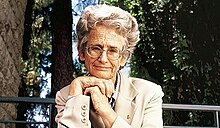Ruth Gavison
Ruth Gavison ( Hebrew רות גביזון, * March 28, 1945 in Jerusalem ; † August 15, 2020 ) was an Israeli professor of law at the Hebrew University of Jerusalem . She specialized in ethnic conflict, minority protection, human rights, political theory and procedural law. She also dealt with issues relating to religion and politics and Israel as a Jewish and democratic state.
Life
Gavison was born into a Sephardic Spanish-speaking family prior to the founding of the state in Palestine . Her father was from North Africa and her mother's family was from Greece. Gavison grew up in Haifa, where she attended school. She studied at the Hebrew University in Jerusalem and graduated in law in 1969. From then on, she took up teaching duties at this university. In 1970 she obtained a BA in philosophy and economics . She also studied at Oxford University in the UK , where she earned a PhD in Legal Philosophy in 1975 .
From 1978 on she had a teaching position at Yale University and from 1984 taught at the chair of human rights at the Hebrew University. From 1990 Gavison held a full professorship in the Faculty of Law at the Hebrew University. She also taught at the University of Southern California from 1990 to 1991, and served on the College of the Center for Human Values at Princeton University from 1998 to 1999 .
Ruth Gavison was a founding member of the Association for Civil Rights in Israel (ACRI), of which she was a board member for many years and which she chaired from 1996 to 1999. She was a member of the International Legal Commission . Gavison has been a member of public investigative commissions on several occasions in the past. From September 2006 she was a member of the Winograd Commission , which was supposed to investigate inadequacies in the preparation of Israel for an armed conflict and in the warfare of the Israeli forces during the 2006 Lebanon War . In 1976 she was a member of the Kahan Commission on Privacy Protection, the work of which resulted in the passage of a law in 1981. Two years later she helped to amend the law. From 1987 to 1990 she was a member of a public commission investigating the relationship between believing and secular Jews in Israel. From 1996 to 1997 she was a member of the Zadok Commission, which dealt with press laws, and then Gavison worked on the Shamgar Commission, which dealt with the appeal of the Attorney General and related issues.
In 2011 she was awarded the Israel Prize in the Jurisprudence category.
Individual evidence
- ^ Professor Ruth Gavison, recipient of the Israel Prize, dies at 75. In: Jerusalem Post. Retrieved August 15, 2020 .
- ^ Ofra Edelman: Prof. Ruth Gavison wins Israel Prize for legal research. In: Haaretz . March 21, 2011, accessed May 21, 2011 .
| personal data | |
|---|---|
| SURNAME | Gavison, Ruth |
| BRIEF DESCRIPTION | Israeli legal scholar |
| DATE OF BIRTH | March 28, 1945 |
| PLACE OF BIRTH | Jerusalem , Palestine |
| DATE OF DEATH | 15th August 2020 |
